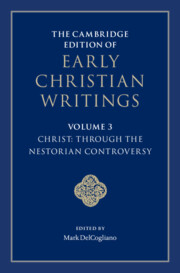Book contents
- The Cambridge Edition of Early Christian Writings
- The Cambridge Edition of Early Christian Writings
- The Cambridge Edition of Early Christian Writings
- Copyright page
- Contents
- Notes on Contributors
- Acknowledgments
- Note on the Texts and Translations
- Abbreviations
- Series Introduction
- Introduction
- Part I The Beginnings of Christology
- 1 Ascension of Isaiah 6–11 (Ethiopic Version)
- 2 The Gospel of Peter
- 3 The Epistle of the Apostles
- 4 The First Letter of Clement (Selections)
- 5 Ignatius of Antioch, Letters (Selections)
- 6 Epistle to Diognetus 1 and 7–12
- 7 Justin Martyr, First Apology 23, 30–32, 46, 63 and Second Apology 10, 13
- 8 Tatian, Address to the Greeks 4–7
- 9 Odes of Solomon 7, 19, 41, and 42
- 10 Treatise on Resurrection
- 11 A Ptolemaic Theology as Recounted by Irenaeus of Lyons in Against Heresies 1.8.5
- 12 Irenaeus of Lyons, Against Heresies (Selections)
- Part II Developing Christological Traditions
- Part III Traditions of Pro-Nicene Christology
- Part IV Controversy over Nestorius
- Suggestions for Further Reading
- Scriptural Index
6 - Epistle to Diognetus 1 and 7–12
from Part I - The Beginnings of Christology
Published online by Cambridge University Press: 05 February 2022
- The Cambridge Edition of Early Christian Writings
- The Cambridge Edition of Early Christian Writings
- The Cambridge Edition of Early Christian Writings
- Copyright page
- Contents
- Notes on Contributors
- Acknowledgments
- Note on the Texts and Translations
- Abbreviations
- Series Introduction
- Introduction
- Part I The Beginnings of Christology
- 1 Ascension of Isaiah 6–11 (Ethiopic Version)
- 2 The Gospel of Peter
- 3 The Epistle of the Apostles
- 4 The First Letter of Clement (Selections)
- 5 Ignatius of Antioch, Letters (Selections)
- 6 Epistle to Diognetus 1 and 7–12
- 7 Justin Martyr, First Apology 23, 30–32, 46, 63 and Second Apology 10, 13
- 8 Tatian, Address to the Greeks 4–7
- 9 Odes of Solomon 7, 19, 41, and 42
- 10 Treatise on Resurrection
- 11 A Ptolemaic Theology as Recounted by Irenaeus of Lyons in Against Heresies 1.8.5
- 12 Irenaeus of Lyons, Against Heresies (Selections)
- Part II Developing Christological Traditions
- Part III Traditions of Pro-Nicene Christology
- Part IV Controversy over Nestorius
- Suggestions for Further Reading
- Scriptural Index
Summary
This anonymous letter to the otherwise unknown Diognetus is an early Christian apology in epistolary form. Since the seventeenth century it has been included in the collection of early Christian writings known as the Apostolic Fathers. Most scholars suggest a date between 150 and 200 for its composition – that is, at least for sections 1–10. The original text breaks off before its conclusion, and sections 11–12 were apparently appended at a later date from some other work. Sections 1–10 are addressed to an inquirer who wants to learn more about Christianity, whereas sections 11–12 appeal to Gentile converts to Christianity. The apologetic intent of the epistle is evident from its first part where the author mocks paganism and Judaism, emphasizing instead the distinctiveness and superiority of Christianity in terms of way of life (sections 2–6). In addition to section 1, translated below are sections 7–12. In sections 7–10 the author explicates the role of Christ in God’s plan of salvation. Particular stress is placed on the necessity of acquiring the knowledge of God revealed by Christ and the moral obligation that it entails, which is described as imitating God.
- Type
- Chapter
- Information
- The Cambridge Edition of Early Christian Writings , pp. 63 - 68Publisher: Cambridge University PressPrint publication year: 2022

